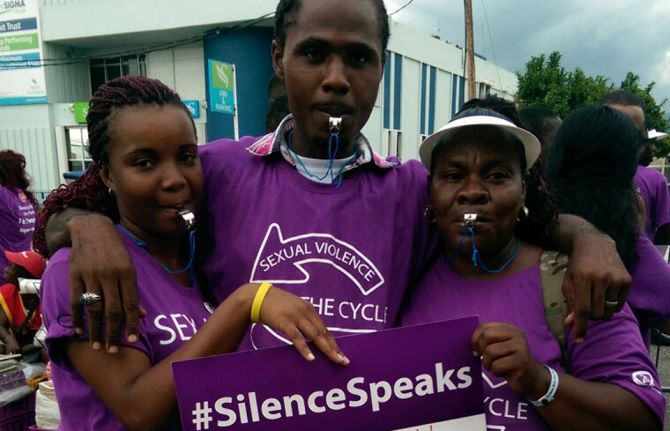

Feature Story
How one Jamaican organization is empowering adolescent girls living with HIV
10 November 2016
10 November 2016 10 November 2016Rushell Gray unflinchingly shares the story of her journey to the edge and back. She was infected with HIV after being abused at the age of nine, but her eight-year-old daughter is HIV-free. “It has been difficult. As a young girl in the community everybody turned a blind eye and blamed me,” she said. “Nobody said this man needs to go to jail. At one point I gave up because the stress was too high,” she recounts.
A petite young woman, Ms Gray is confident and articulate. She credits the Jamaican nongovernmental organization Eve for Life and its transformative programme for her turnaround. Through a combination of counselling, personal development and life-skills education, she has become one of the powerhouse peer educators of Mentor Moms.
The Mentor Moms programme deploys young, empowered women who are affected by HIV and young mothers to help others along the journey. They answer questions and offer reassurance, accompany adolescent girls to their clinic visits and they reinforce guidance on taking medicines, avoiding breastfeeding and keeping clinic appointments.
Ms Gray clarifies that the issues her mentees face are not just about HIV. “They do not have resources, they are not safe in their houses, they are afraid a partner or their family might throw them out. They might have two children or more,” she said. A 2012 survey by the Jamaica National HIV/STI Programme found that one in every five adolescent girls in Jamaica aged 15–19 years reported having experienced sexual violence.
Eve for Life Executive Director and co-founder Patricia Watson noted that many girls are being left behind. “A recent study showed that among girls in state care, 30% have sexually transmitted infections, 41% attempted suicide and 35% have been forced to have sex. Also, children infected with HIV at birth are growing older and becoming sexually active, some without having been informed about their status,” she said.
For the organization, responding to HIV among adolescent girls is about far more than promoting sex messages. It is fundamentally about social protection and addressing the structural and social issues that increase girls’ vulnerability.
For the past two years, Eve for Life has spearheaded the Nuh Guh Deh! (Don’t Go There) national campaign to end sex with girls.
“The overarching goal is to contribute to reducing sexual abuse of girls in Jamaica,” Ms Watson said.
The campaign seeks to mobilize Jamaicans to report acts of sexual violence while increasing awareness about the long-term effects of abuse and the links to HIV. Survivor stories highlight the serious issues they face. The approach maximizes participation and ownership from adolescent girls and young women who have survived sexual abuse.
The Nuh Guh Deh song by the Jamaica dub poetry group No-Maddz aims to reduce social acceptance of predatory relationships between older men and girls.



